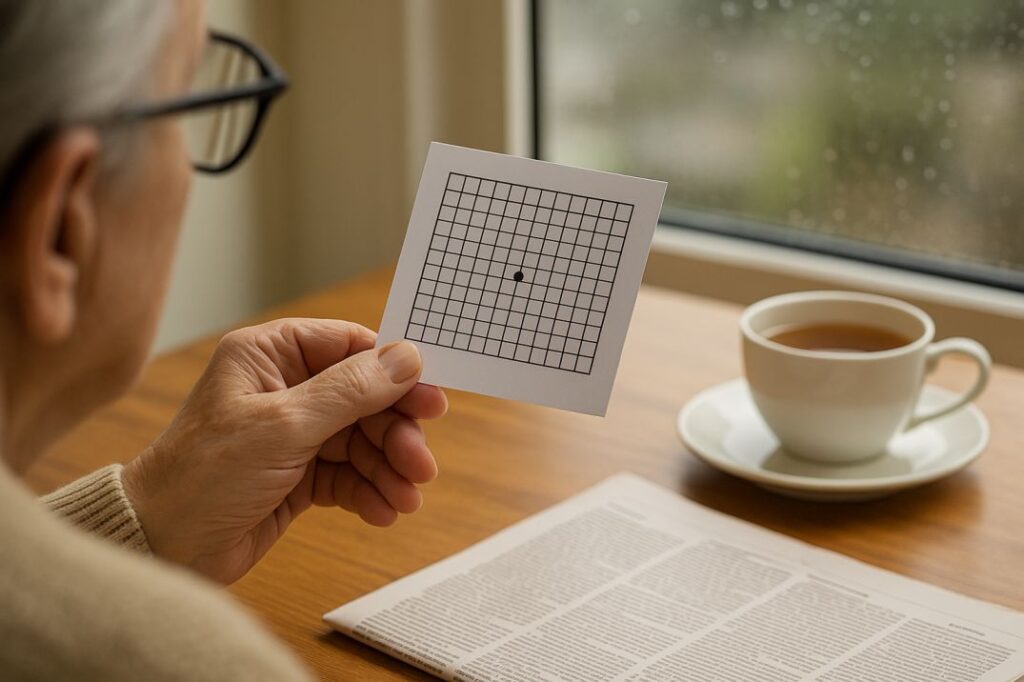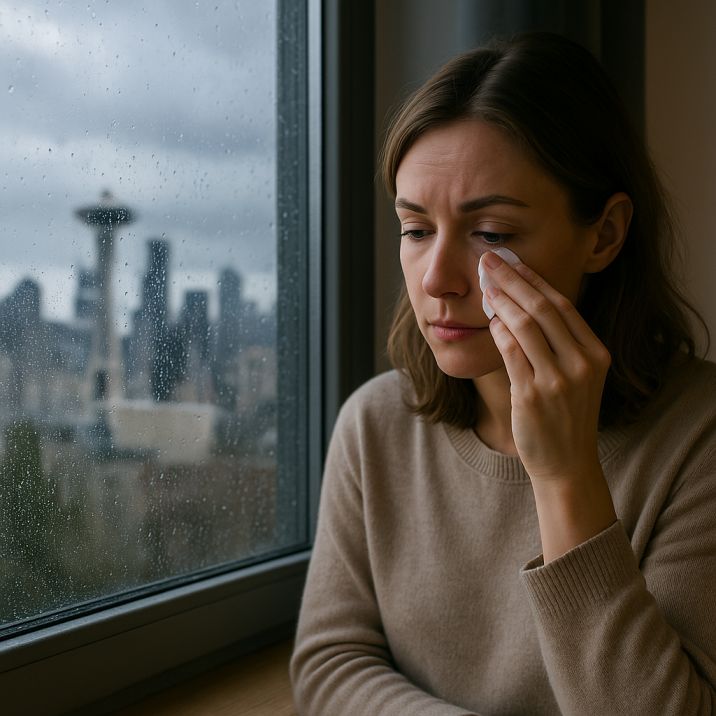Macular Degeneration Explained by Seattle Experts
Macular degeneration can silently steal your central vision—are you at risk? Learn how Seattle residents can spot early signs, slow progression, and access expert eye care.
Key Takeaways: Understanding Macular Degeneration in Seattle
-
Two Main Types of AMD: Dry AMD is most common; wet AMD is more severe but treatable with injections and advanced therapies.
-
High-Risk Groups: Adults over 50, smokers, those with cardiovascular issues, and people with light-colored eyes or poor diet are at higher risk.
-
Seattle-Specific Tip: Despite cloudy weather, UV rays still reach your eyes—wear UV-protective sunglasses year-round, especially near water or at elevation.
-
Early Detection Matters: Blurred central vision, wavy lines, and difficulty reading may signal AMD. Use the Amsler Grid to monitor changes at home.
-
Prevention Starts with Lifestyle: Quitting smoking, eating leafy greens and omega-3s, exercising regularly, and managing blood pressure can all help slow AMD.
-
Clinically Proven Supplements: The AREDS2 formula is recommended for intermediate and advanced dry AMD stages.
-
Advanced Treatments Available in Seattle: Includes anti-VEGF injections, laser therapy, telescopic implants, and emerging drugs like Syfovre™ and Izervay™.
-
Support Beyond the Exam Room: Access local low-vision aids, tech tools, and peer support via Vision Loss Connections and Lighthouse for the Blind.
-
Seattle’s Research Edge: Local clinics participate in AMD trials for gene therapy, AI diagnostics, and regenerative solutions, offering hope for the future
Understanding Macular Degeneration in Seattle
Macular degeneration (AMD) damages the macula, your retina’s central vision zone. Two primary types:
-
Dry AMD: Most common (90% of cases), involves macular thinning
-
Wet AMD: Severe but less common, features include abnormal blood vessel growth
Key Risk Factors:
-
Age 50+ (risk increases significantly after 60)
-
Family history of AMD
-
Smoking or tobacco use
-
Cardiovascular conditions (hypertension/high cholesterol)
-
Light-colored eyes
-
Prolonged UV exposure without protection
-
Diets low in leafy greens and omega-3s
Seattle-Specific Insight:
Our frequent overcast skies still transmit harmful UV rays. Cannon EyeCare recommends year-round UV-blocking sunglasses—especially during waterfront activities or mountain trips.
Detecting AMD Early: Symptoms & Diagnosis
Early signs often develop gradually:
-
Blurred or distorted central vision
-
Difficulty recognizing faces or reading
-
Straight lines appearing wavy (test with Amsler grid)
-
Needing brighter light for close tasks
Advanced Diagnosis at Cannon EyeCare:
-
Comprehensive Dilated Exam: Retinal assessment
-
OCT Imaging: Cross-sectional retina scans
-
Amsler Grid Monitoring: Track vision changes at home
-
Retinal Photography: Document progression
Slowing AMD Progression: Prevention Strategies
While AMD has no cure, these evidence-based steps reduce risk and slow progression:
Lifestyle Modifications
-
Quit Smoking: Doubles AMD risk if continued
-
Eye-Healthy Diet: Leafy greens (kale, spinach), berries, fatty fish, and almonds
-
Regular Exercise: 30+ minutes daily for cardiovascular health
-
Blood Pressure/Cholesterol Control: Critical for retinal blood flow
-
UV/Blue Light Protection: Wear sunglasses outdoors; use blue filters on devices
-
Weight Management: Obesity elevates inflammation
Clinically Proven Supplements
The AREDS2 formula (vitamins C/E, zinc, copper, lutein, zeaxanthin) slows intermediate/advanced AMD.
Advanced AMD Treatments at Cannon EyeCare
Dry AMD Management
-
AREDS2 Supplements: For intermediate/advanced cases
-
Emerging Therapies:
-
Pegcetacoplan (Syfovre™) – approved 2023
-
Avacincaptad pegol (Izervay™) – approved 2023
-
Gene therapies in clinical trials
-
Wet AMD Treatments
-
Anti-VEGF Injections (administered in our Seattle clinic):
-
Ranibizumab (Lucentis®)
-
Aflibercept (Eylea®)
-
Faricimab (Vabysmo®) – fewer injections needed
-
-
Laser Therapy: For specific lesion types
-
Implantable Telescopes: For end-stage cases (CentraSight® program)
Home Vision Monitoring with the Amsler Grid
Track AMD changes between Seattle eye exams using this simple method:
-
Hold the grid at reading distance under bright light
-
Cover one eye and focus steadily on the center dot
-
Repeat with the other eye
-
Contact Cannon EyeCare immediately if you see:
-
Wavy or distorted lines
-
Blurry/missing grid sections
-
Dark spots in central vision
-
Seattle AMD Support Services & Resources
Low Vision Aids at Cannon EyeCare:
-
Custom magnifiers and task lighting
-
Large-print and audio devices
-
Digital screen readers
Local Support Networks:
-
Vision Loss Connections (Seattle Chapter): Peer-led monthly meetings
-
Lighthouse for the Blind Northwest: Assistive tech training
-
UW Medicine Vision Rehabilitation: Occupational therapy
Community Resources:
-
King County Library’s talking books program
-
Washington State Department of Services for the Blind
-
Senior Center of West Seattle mobility classes
Tech Solutions for Seattle Residents:
-
Apple Vision Pro demonstrations at our clinic
-
Voice-activated home systems (Alexa/Google Home integration)
Emerging AMD Treatments: Seattle’s Research Frontier
Breakthrough Therapies in Development
-
Small Molecule Inhibitors: GSK3-targeting drugs showing promise in halting early AMD changes
-
ANX007: Groundbreaking injection reducing vision loss in geographic atrophy (advanced dry AMD)
-
Gene Therapies: Potential one-time treatments for inherited AMD risks
-
Stem Cell Applications: Retinal cell regeneration approaches
Seattle’s Role in AMD Innovation
-
Local Clinical Trials: Cannon EyeCare screens patients for UW Medicine and Fred Hutch studies
-
Future Outlook: Next-generation anti-VEGF formulations requiring fewer injections
-
AI Diagnostics: The University of Washington is developing predictive algorithms using retinal scans
Protecting your vision starts with awareness, early detection, and proactive care. Whether you’re noticing subtle vision changes or have a family history of AMD, the right steps today can make a lasting difference. With Seattle’s leading-edge treatments, supportive resources, and dedicated specialists, you’re never alone on this journey.
Take the next step—schedule a comprehensive eye exam with Cannon EyeCare today and stay ahead of macular degeneration. Your vision is worth it.
FAQs
-
Eat leafy greens, quit smoking, protect your eyes from UV light, and take AREDS2 supplements if recommended by your eye doctor




